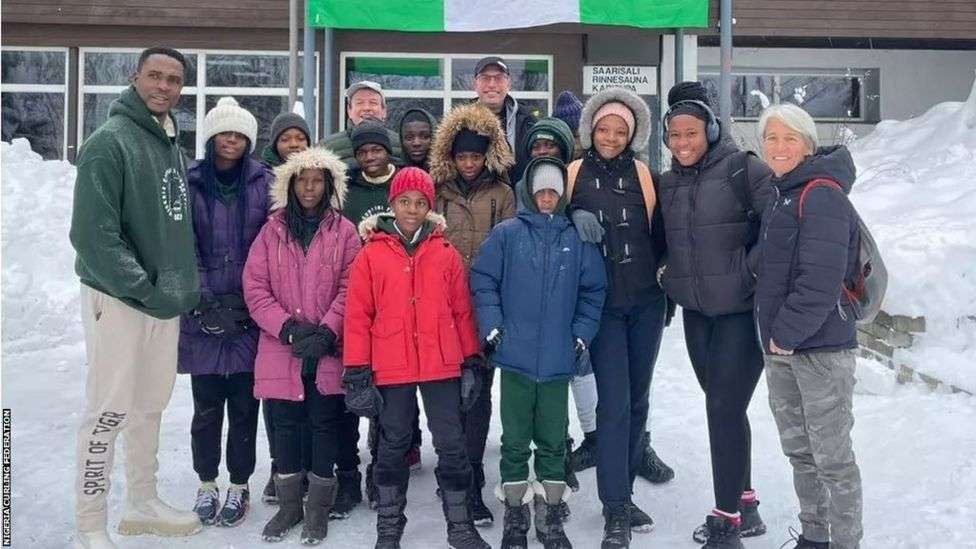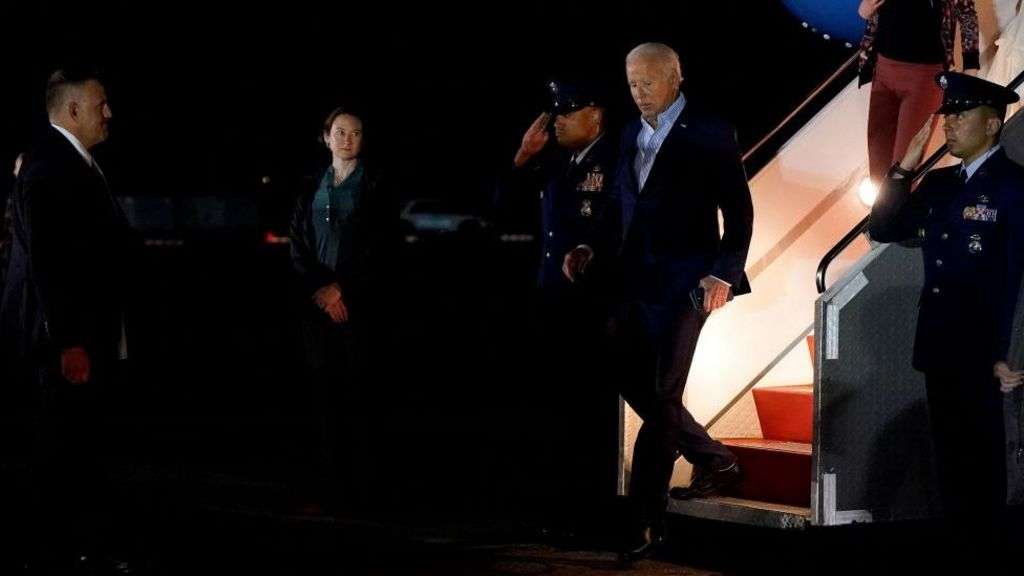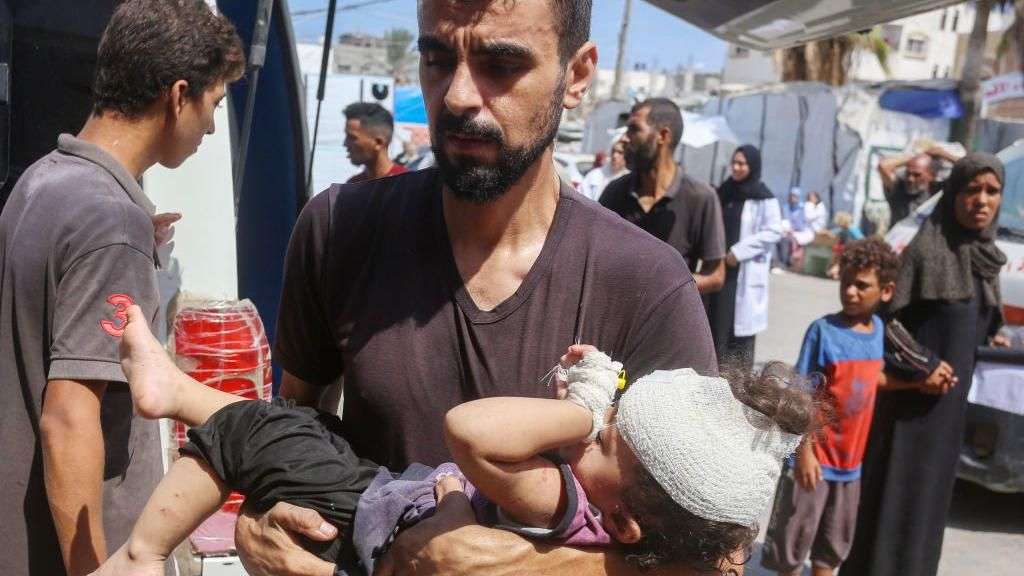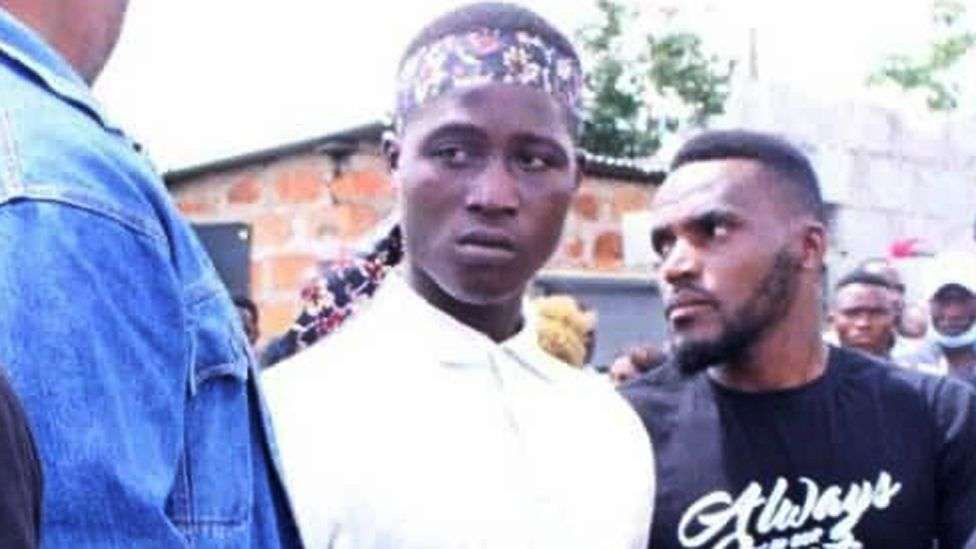A group of Nigerian youngsters have become Africa's first curling team to reach a Winter Youth Olympics but their arrival at the 2024 Gangwon Games was far from certain.
Their journey has been an unlikely one, given the lack of facilities - and particularly ice - in Nigeria, and their struggle encapsulates the continent's challenge to break into winter sports.
The history-making teenagers secured Nigeria's spot at the Games following their participation at the World Junior-B Curling Championships held in Lohja, Finland, in December 2022.
Yet the team have trodden a slippery path over the 13 months since then as a lack of funding threatened their participation in South Korea this month, leaving them frustrated and neglected despite their achievement.
"All our hard work (goes) to waste if we don't make it to the Games despite qualifying," Daniel Babalola, a 17-year-old curler for the team, nicknamed the Broomzillas, told OceanNewsUK of the battle to reach Gangwon.
The International Olympic Committee funded the transport of three male and three female athletes but not the two reserves, who would be called on in case of injury or illness.
Nor, crucially, was money available for the travelling officials, coaches and chaperons, which threatened the entire trip.
The frustration of potentially missing out on the Games was evident on the faces of all the athletes, who feared their dreams of participating in South Korea were going to be dashed.
The Nigerian team started a fundraising appeal in an attempt to raise 68,000 euros ($73,800), but barely any money was pledged.
Ultimately the money required to travel came from the private savings of the team's parents and Daniel Damola Oyedepo, president of the Nigerian Curling Federation (NCF).
"Our parents and coaches have worked hard to help us fulfil our dreams to fly Nigeria's flag at the Olympics," said 15-year-old team member Oluwanimifise Wale-Adeogun.
No support from sports ministry
Participating in the curling competitions in Gangwon, which begin on Saturday, will be a far cry from the facilities the team are used to in Nigeria.
With no ice rink to practise on, they train on a carpet surface in an apartment in Lagos.
"We started in 2018 but our regret is no-one is supporting us," coach Imonite Kennedy told OceanNewsUK.
"Despite not having a natural ice environment, we make do with floor curling yet no support has come from the government to help our ambitions."
A high-ranking official of Nigeria's ministry of sports development, Ismaila Abubakar, was clear that no backing was available for the sport.
"It's not a major sport in Nigeria. We don't have the money or the facility for the sport here," he told OceanNewsUK.
When asked about the team's struggle to compete at the Winter Youth Olympics despite their historic qualification, he replied: "It doesn't matter.
"Since we do not have money for it, there's nothing we can do about it."
Wale-Adeogun got into curling after watching it on TV, having heard about the sport from her mother.
"It's a very competitive but friendly sport, anyone can do it, whether you are as young as me or as old as my grandfather," she said.
"When the coaches needed young curlers for the youth team, I signed up and now I am set to become an Olympian."
NCF president Oyedepo says the sport has been built from the ground up in the West African country.
"We achieved this success using mostly home-based athletes, who had never been on ice before the qualifiers," he said.
"It's an historic achievement for us, being the first of its kind in the entire African region."
Given the lack of facilities across the continent, several other winter sports athletes who have represented African nations have been raised abroad.
Nigeria's curlers will be joined in South Korea by France-born skier Issa Laborde, who chose to represent his mother's country of Kenya., external
Fellow Kenyan Ashley Ongonga, who is based in Italy, will become the first female cross-country skier from the continent of Africa to compete at the Winter Youth Olympics.
Africa has 'exciting' future in winter sports
Simidele Adeagbo is a prime example of how most African representatives access winter sports from outside the continent.
The 42-year-old was born in Canada but became the first Nigerian to compete at the Winter Olympics, featuring in the skeleton competition at Pyeongchang 2018.
Those Games featured eight African nations and suggest that winter sports are gradually being embraced by a continent better known for its climatic limitations.
Adeagbo believes African prospects are exciting across winter disciplines at all levels.
"The Olympics is the biggest global sport event and you need to have representation from all continents there," Adeagbo told OceanNewsUK.
"Africans should be excited about the future because it is bright. I can see it already with so many ideas being put forward by Africans to change the world and shape the future."
Adeagbo, who runs the non-profit SimiSleighs Foundation,, external is focused on providing support for adolescent girls through leadership training skills and providing a platform for girls through sport.
She aims to become Africa's first Winter Olympics medallist in 2026 but knows youth athletes need financial backing.
"We definitely need support as athletes can't do it on their own. It's really a very difficult journey," Adeagbo added.
NCF president Oyedepo shares Adeagbo's optimism that Africa can become a regular feature in winter sports, despite the challenges the continent faces.
"We are introducing floor curling to Africa, where every child can play curling in their homes, without getting on ice," Damola revealed to OceanNewsUK.
"The World Curling Federation has already adopted floor curling as a discipline under its watch. It will be an advantage for Africa, where every nation can compete and win medals.
"Nigeria has a huge prospect in winter sport. The impossible may take a little longer but winter sport has come to stay in Africa."








